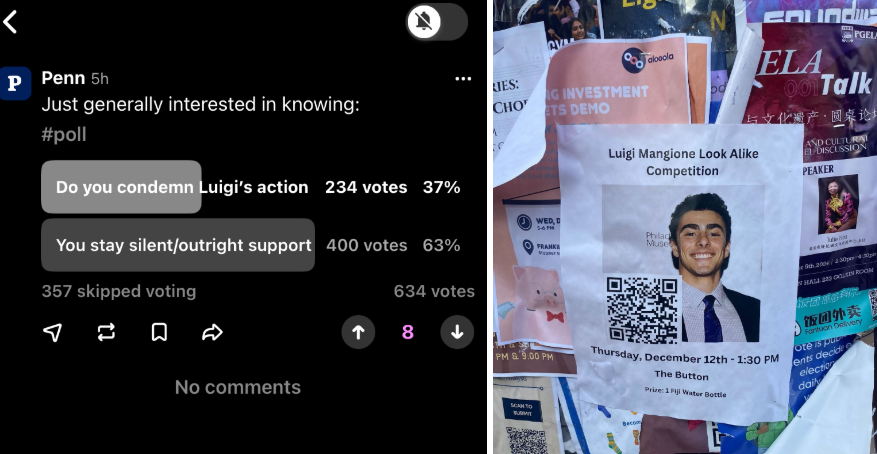(Not So) Hot Takes | Anti-corporation mentality rears its ugly head on Penn’s campus with the support of Luigi Mangione

Photo Credit: Jennifer Mesa
By Emma McClure
The murder of United Healthcare CEO Brian Thompson, allegedly committed by Penn alumnus Luigi Mangione, has captured the attention of every major news outlet in the nation. The alleged involvement of a Penn grad has drawn particular attention on campus, though not for the reasons one might hope. Rather than condemning this show of remarkably planned violence, a number of students on campus condone or outright support it, according to a poll on the anonymous platform Sidechat. One student even organized a Luigi Mangione look-alike contest complete with prizes, showcasing remarkable disregard for Thompson’s life.
This sentiment even reaches beyond Penn students: Julia Alekseyeva, an Assistant Professor of English and Cinema and Media Studies here at Penn, made several social media posts praising Mangione’s alleged actions, stating that she has “never been prouder to be a professor at the University of P[e]3nnsylvania.” Alekseyeva has since removed her posts, apologizing for their insensitivity amid online backlash and calls for her termination.
School of Arts and Sciences Deputy Dean Jeffrey Kallberg issued a statement regarding Alekseyeva’s comments, saying her remarks are “antithetical to the values of both the School of Arts and Sciences and the University of Pennsylvania.” No amount of retraction or apologizing, however, can cover up the general sentiment around Thompson’s murder that has spread across campus. Reactions like Alekseyeva’s shed light on an ugly truth that apology posts and public statements can’t hide.
The fact of the matter is that an anti-corporation mentality has taken over this campus, and it is rearing its head in celebration of Thompson’s death. It is one thing to disagree with the operation of United Healthcare, another to celebrate the death of its CEO, or any human being, for that matter. This anti-corporation mentality is no longer a matter of disagreement; it’s a justification for criminal action.
Coming into Penn as an aspiring prosecutor, I was shocked to go through multiple criminology classes hearing students say it isn’t really a crime to steal from big corporations like Walmart because it isn’t hurting anyone except the corporation. For some reason, students were willing to acknowledge that someone (the corporation) was hurt but turned a blind eye because they felt that mega-corporations don’t need their profits. Apparently the countless people being employed by those companies don’t matter because a few folks at the top “already have enough wealth.”
Setting aside the plain fact that theft is still a crime and one shouldn’t take what doesn’t belong to them, the justification that large corporations don’t need profit fails on a more fundamental level. Profits from the goods ‘worthy of stealing’ don’t simply find their way into the pockets of a few top-dogs. These profits pay the wages of countless everyday workers who rely on their jobs at these same corporations to support themselves in their families. Running a business into the ground through relentless theft or other criminal actions against the “corporation” does more harm to the average workers who rely on those wages than it ever will to those who “already have enough money.”
This mindset that justifies crime is, on its own, plenty bad; however, in light of Thompson’s murder, we’re expanding this already dangerous mindset to dehumanize and even justify violent crime directed at leaders of large or unpopular companies. At what point did we stop caring about human life because we don’t like the company they work for?
To those who believe that Thompson is responsible for the deaths of anyone unable to afford medical treatment under United Healthcare’s insurance, I remind you that individuals are not called to be their own arbiters of justice. Murder is not and should not ever be considered a political statement. If you believe that health insurance companies are doing things wrong, you can make that statement peacefully through public platforms and through the political process. Brian Thompson’s death does nothing to change the health insurance industry, but it does take the life of a husband and father. It sends the message that violence is an acceptable method of political dissent, which it most certainly is not.
As we reflect on this recent murder and the alleged involvement of a Penn grad, we ought to bring humanity back into the picture. Instead of defending a murder with another rant about why America should have socialized healthcare, stop and consider that a man lost his life—a human being. No matter how much you disagree about how healthcare should be run in our country, you need to lay down your anti-corporation mindset long enough to realize that violence is not the answer.
Emma McClure is a sophomore in the College studying Criminology and minoring in Legal Studies and History from Columbus, GA. Emma is also The Social Ivy editor at The Pennsylvania Post. Her email is efmcc@sas.upenn.edu.



